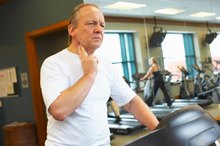Why Would a Physically Fit Person's Heart Rate Return to Normal Faster Than an Unfit Person's?
Heart rate recovery is the amount of time it takes for your heart to return to a normal level following exercise 1. Usually this is measured at a physician's office with the use of a treadmill stress test. The heart rate of a physically fit person returns to normal rhythm faster than that of an untrained person because of the training response on the body's autonomic nervous system 12.
Autonomic Nervous System
The two parts of your autonomic nervous system that are involved with your heart rate's response to exercise are the sympathetic and parasympathetic nervous systems 12. These systems regulate heart rate, blood pressure, breathing rate, and the release of glucose for energy. Your nervous system is at work as long as you are alive, not only during exercise. It aids in digestion, urine production and other bodily functions that you do not have to think about in order for them to occur.
- The two parts of your autonomic nervous system that are involved with your heart rate's response to exercise are the sympathetic and parasympathetic nervous systems 1.
Sympathetic Nervous System
Why Does Your Heart Beat Fast When You Exercise?
Learn More
When you begin exercise, or even think about exercising, your sympathetic nervous system responds with an increase in your heart rate to prepare for the activity 12. This nervous system also will begin to increase your breathing pace and elevate your blood pressure to circulate the oxygen needed for the exercise 2. Your body also begins to transport glucose into your cells to be used as energy.
Parasympathetic Nervous System
When you finish exercise, your parasympathetic nervous system slows your heart rate, breathing rate and blood pressure to return your heart rate to resting levels 1. This system undergoes a training effect after you consistently spend time in exercise. The parasympathetic nervous system becomes more efficient and will slow your heart rate quicker as you become more physically fit.
Heart
How to Read an EKG for Dummies
Learn More
Your heart undergoes a training effect as you exercise and becomes more efficient in pumping out necessary oxygen. One of the benefits of exercise training is that your heart pumps out more blood with each beat, so it does not have to beat as often as it did when you were untrained. This causes your training heart rate to be lower, so your return time to your resting level will be shorter.
Related Articles
References
- American Fitness: Heart Rate Response to Exercise
- Neuroscience for Kids: The Autonomic Nervous System
- Adams and Victor's Principles of Neurology, 9th ed: The McGraw-Hill Companies, Inc., 2009.
- Blumenfeld H, Neuroanatomy through Clinical Cases. Sunderland: Sinauer Associates Publishers 2002.
Writer Bio
A mother of two and passionate fitness presenter, Lisa M. Wolfe had her first fitness article published in 2001. She is the author of six fitness books and holds an Associate of Arts in exercise science from Oakland Community College. When not writing, Wolfe is hula-hooping, kayaking, walking or cycling.









